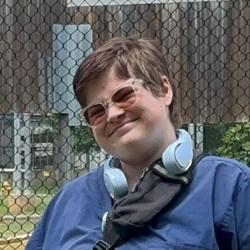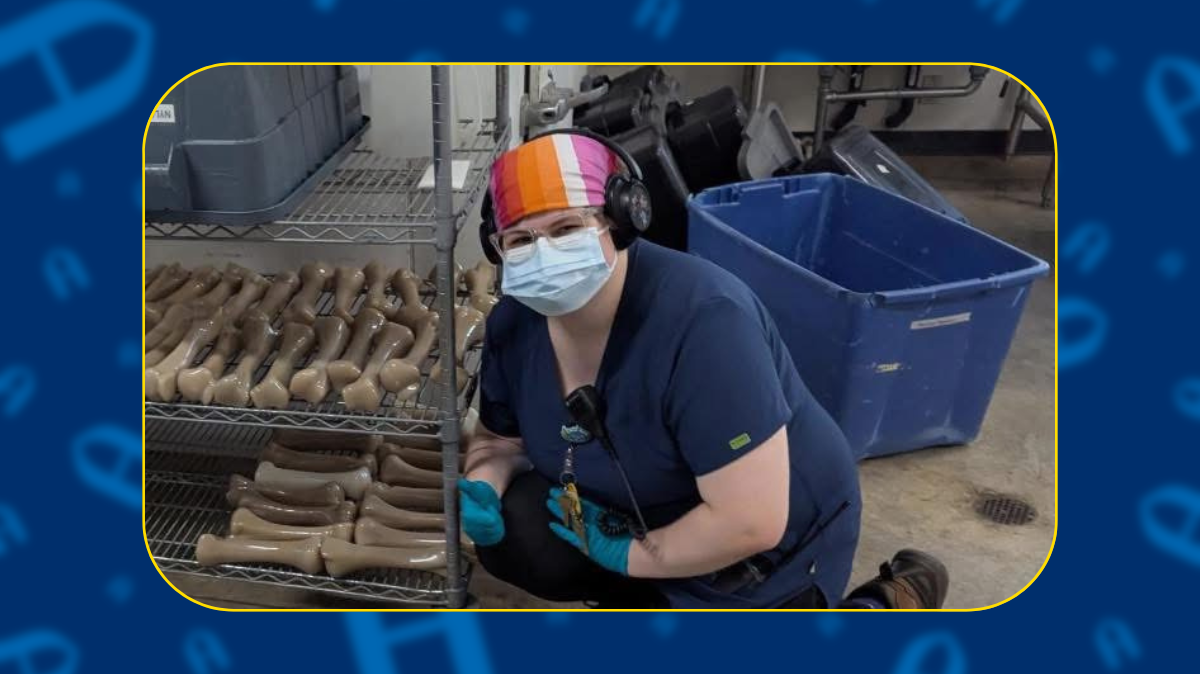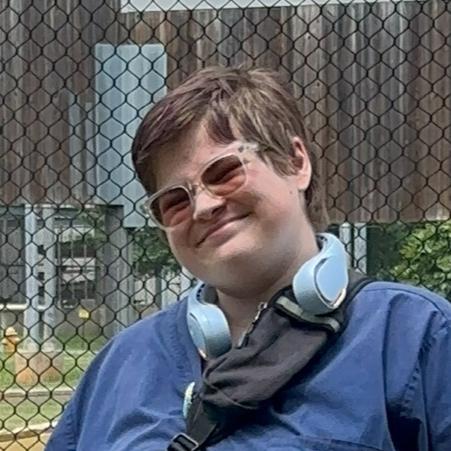A haven where chimps and humans connect
This summer, I had the honor of interning in the Behavior Department at Chimp Haven in Keithville, La., a sanctuary for chimpanzees that were retired from biomedical research. After a rough start in life, these chimps get a happy retirement where they can live the life they want — be it climbing and making cozy nests, playing with their friends, enjoying fresh produce and fun enrichment puzzles, or building relationships with both other chimps and their human caretakers.
It was admittedly a pie-in-the-sky application. I had heard of it through the grapevine after offhandedly mentioning being curious about working with primates to my former supervisor at Lincoln Park Zoo, and figured the worst thing that could happen is a rejection. In fact, I was so shocked when I actually got the position that I ended up having a miniature existential crisis. However, my academic advisor and CORE career advisors at Augustana encouraged me to give it a shot.
A peaceful and chaotic job
Chimp Haven is hard to find; I thought I had gotten lost when I entered the winding roads of the county park where it’s located, but the distant pant-hoots of the chimps soon assured me that I was in the right place. My mentor greeted me at the gates, and I was soon situated in Coypu Village, the onsite intern housing.
While the pay was somewhat meager, at $125 a week (not counting the grant Augustana gave me to help with the pay), Chimp Haven takes care of their staff by providing them with housing and all the equipment one needs to work with chimps. Each unit is lovingly decorated with adorable chimp photos, quaint animal-themed mugs, cozy blankets and original paintings made by the chimps.
It’s simultaneously a peaceful and chaotic job. Many mornings are spent quietly observing the chimps while they eat their breakfast, as they bring their fresh produce up to their climbing structures to snack on and then take a nap. Preparing enrichment is a delightfully zen process, where yummy snacks are placed into food puzzles for the chimps.
The hum of an AC, the sound of a podcast in your ear, the smell of fresh produce and quiet conversations with coworkers about anything and everything is a peace I have not felt in a long time. This repetitive peace is balanced with the constant shenanigans the chimps get into, like catching a turtle, breaking their drinking faucets and turning them into a waterpark attraction, and plenty of screaming squabbles over God knows what.
Chimp Haven is a no-contact facility, meaning you cannot have direct physical contact with the chimps. This is a safety measure for both humans and chimps, as both can get the same diseases. This is not to say that you can’t build close bonds with them — quite the opposite, really.
The enclosures use steel mesh, a sturdy material that allows them to climb and shake and hang from without hurting themselves or breaking the material, which lets you offer them snacks through the mesh. The chimps may try to groom your boots, and some chimps love getting tummy tickles with the handle of a long spoon. This also allows easier access for medical care.
However, chimps are notoriously clever and mischievous animals, and there is no such thing as a boring day with them. Some may try to get you to stop doing your job to play with them — be it spraying the hose into their enclosure (which is especially appreciated during the hot Louisiana days) or starting a game of chase or stompies. I admittedly gave into them countless times.
If you even think about standing next to the many fig or pear trees that have sprouted on the sanctuary, many will make cute grunting or raspberry noises to try and persuade you into sneaking them a snack. Despite not sharing a common language, the chimps know how to let you know what they want.
Joyce, the silly chatterbox chimp
Everyone who works and has worked at Chimp Haven has their favorite chimp, and I’m no different. Joyce is a quirky, talkative little lady, who took an interest in the observations I was doing on her neighbors. She’s low ranking in her group’s dominance hierarchy, so she preferred to get my attention when I wasn’t helping with handing out enrichment and her troopmates were distracted by their mealtimes.
Once she had my attention, she climbed down from the shelf she was sitting on, then motioned with her head for me to follow her. At first, I thought she was trying to initiate a game of chase like her groupmates Sparky and Alfredo, but she just wanted to walk together. While we walked, she’d make happy vocalizations and get more excited when I responded like she was telling a story. It was like she was keeping me up to date on all the chimpie drama. In fact, on my last day, my coworkers gifted me a photo of Joyce, so I could always remember our little conversations.
Lifelong connections
I feel that saying that “I learned so much” undersells my experience. My time at Chimp Haven was a life-changing nine weeks. Yes, I grew my skills in data visualization and analysis, animal care, sanitation, comfort with manual labor, and creativity and adaptability, but I also walked away with lifelong connections to both wonderful people and wonderful animals.
I felt a primal thrill in my chest when the chimps excitedly pant-hooted when enrichment was handed out. My heart fluttered upon earning the trust of shy chimps and seeing their silly sides. I met people who encouraged me to be my best person, not just for the chimps, but for myself, and I woke up every day eager and excited to see what was in store for me.
Chimp Haven is not just a home for retired chimps. It’s a haven for deep connections between humans and animals. I would not have been able to do this without the help of Augustana, and I cannot thank those who encouraged me to take the plunge to do this enough.

Keegan Q. Russell '27 is from Chicago, Ill., and majoring in biology and psychology.


